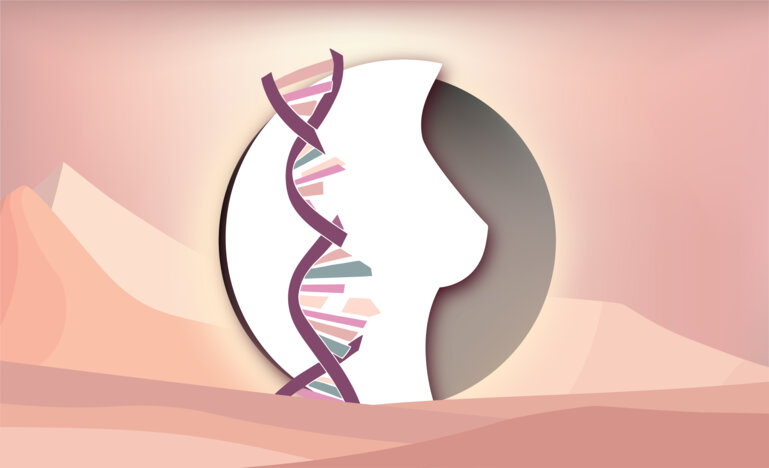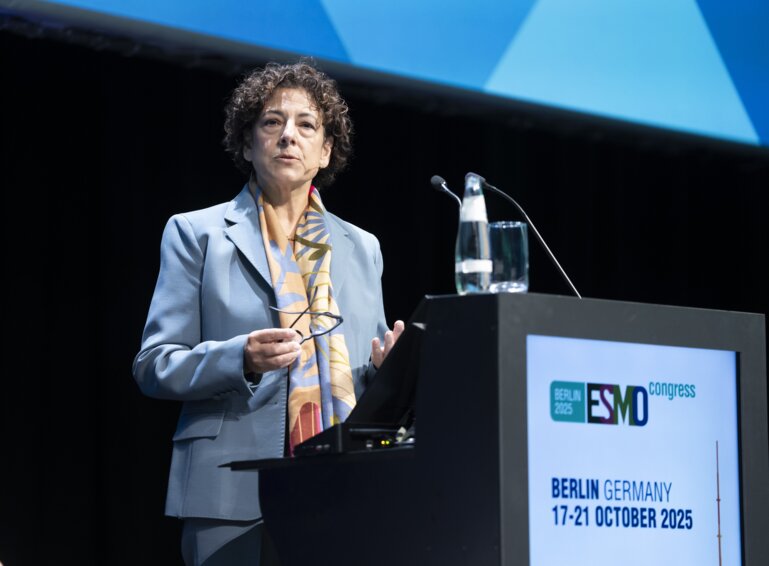In her Keynote Lecture at ESMO Breast Cancer 2022, Prof. Sibylle Loibl looks at neoadjuvant therapy and the fertility and pregnancy issues facing young women with breast cancer
Recipient of the ESMO Breast Cancer 2022 Award, Prof. Sibylle Loibl from the German Breast Group (GBG) Forschungs GmbH, Neu-Isenburg, the Center for Hematology and Oncology Bethanien and the Goethe University of Frankfurt, Germany, has contributed to furthering understanding about breast cancer in pregnancy and the wider treatment-related fertility problems of young women with this disease.
Which of your career achievements to date are you most proud of?
I would say that there are two main pillars to my research interests. Firstly, I am very proud of the Breast Cancer in Pregnancy Register Study we set up to look at foetal and maternal outcomes (NCT00196833), which will celebrate its 20th anniversary next year and which continues to generate important data. Thanks to this and similar studies, we and others have changed the way physicians think about breast cancer in pregnancy. When I first started working in this area, the general tenet was that you could not treat breast cancer during pregnancy. Today, the majority of patients are treated and their outcome is in line with that of non-pregnant women in the same age group.
I am also proud of the trials I have been involved in that have really helped to further understanding about ovarian failure during breast cancer treatment. The GBG ZORO (GBG 37 ZORO) study – which demonstrated that the luteinising hormone-releasing hormone agonist goserelin did not protect ovarian function in premenopausal women receiving neoadjuvant anthracycline/cyclophosphamide (J Clin Oncol. 2011;29:2334–2341) – was the first randomised trial to publish data of this type. And an analysis of four randomised trials helped to describe chemotherapy-induced ovarian failure in patients undergoing treatment for early breast cancer, its relationship with outcome and its recovery (Eur J Cancer. 2021;152:193–203).
Being a part of the teams preparing guidelines on breast cancer in pregnancy (for example Breast. 2014;23:209–220 and JAMA Oncol. 2015;1:1145–1153) is also immensely satisfying.
The second pillar of my work involves translational research, which is vital to enriching what we know about the disease and its treatment. For example, in the relatively small, proof-of-concept GeparNuevo study, we were able to show that adding the checkpoint inhibitor durvalumab as a primer to neoadjuvant chemotherapy in triple-negative breast cancer (TNBC) led to modulation of the tumour microenvironment and was associated with an improvement in long-term outcome (Ann Oncol. 2019;30:1279–1288; J Clin Oncol. 2021;39(15_suppl):Abstract 506). Research in the neoadjuvant setting is important for getting early signals that can then be translated into better treatments.
What do you think are the most important current unmet needs in the management of breast cancer?
Today, we still cannot cure patients with metastatic TNBC. However, the emergence of novel antibody–drug conjugates (ADCs) brings hope that we may be able to at least extend patients’ lives. These compounds can deliver a high dose of cytotoxic treatment in a focused fashion, by attaching it to a monoclonal antibody directed at a tumour target. The ASCENT trial recently demonstrated that the ADC sacituzumab govitecan improved progression-free and overall survival compared with physicians’ choice of single-agent chemotherapy in metastatic TNBC (N Engl J Med. 2021;384:1529–1541). It is promising that survival could be extended even in heavily pre-treated patients. There are currently a number of different ADCs available and we wait to see how they will play out in the long term.
More work also needs to be done to identify patients with germline BRCA mutations. Until fairly recently, germline mutations in breast cancer were considered important only to inform preventive measures. With the advent of new targeted therapies, we can now improve the outcome of patients with germline BRCA mutations both in the metastatic and early breast cancer settings. However, we are still overlooking too many of these patients and we need to develop tools that will enable us to identify them more easily.
What can be done to improve research in this area?
In a word, collaboration. I devote a lot of my time to clinical research and most of it is spent in collaborative studies. As breast cancers become sub-divided into smaller and smaller molecular subgroups, we will need to join forces if we are to achieve the patient numbers required. Collaboration is also the backbone of translational research and investigator-initiated clinical trials, both of which are key to providing a broad base of knowledge about potential new treatment approaches for our patients.
Don't miss:
ESMO Breast Cancer 2022 Award lecture: What we have learned from neoadjuvant therapy – and what not. ESMO Breast Cancer 2022
03.05.2022, h. 13:10 – 13:40, Berlin Hall
Watch the session on the Congress virtual platform.








